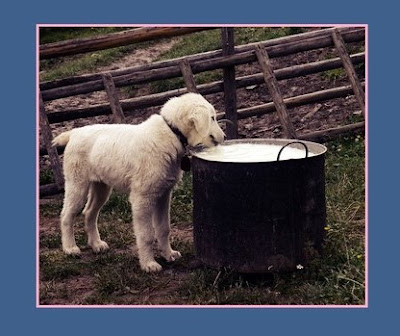Accidental poisons can be perilous for pets.
Curious pets can find potential poisons and face serious
illness or even death as a result. A dog or cat may stumble onto some toxic
substance, which has likely been unintentionally left within the animal’s
reach. In a moment, the pet may consume or even simply roll in the poisonous
matter and become very ill without warning.
NOTE: Written by this author, this copyrighted material originally appeared on another publisher’s site. That site no longer exists. This author holds all rights to this content. No republication is allowed without permission.
Common
pet poisons include alcoholic beverages, antifreeze, artificial sweeteners,
chemicals, chocolate, cosmetics, fertilizers, garlic, grapes, household
cleaners, medications (human or veterinary), onions, perfumes, and pesticides.
Certain house plants, garden flowers, and other vegetation can also be lethal
for pets.
 |
| Adapted by this user from public domain photo. |
What ought a pet
owner to do, if pet poisoning is suspected?
A few common-sense steps are in order.
1. Don’t panic.
This is critical. Seeing a pet in distress can be remarkably
unsettling, but it’s essential to keep a clear head to save the animal.
2. Eliminate the
toxic substance.
Immediately, the pet must be removed from the vicinity of
the possible poison. If possible, it’s important to check the animal’s mouth
and pull out any remaining bits of whatever he or she consumed.
3. Check the pet’s
health and behavior.
Certain symptoms are common with pet poisoning. These may
include accelerated heart rate, coughing blood, diarrhea, dizziness, energy
loss, excessive drooling, excessive thirst, loss of appetite, loss of coordination,
mouth sores, pale gums, panting, seizures, tremors, vomiting (especially
bloody), and more.
4. Call a
veterinarian immediately.
Causing a pet to vomit in the hopes of expelling the poison
is not always smart or safe. The best bet is to contact a veterinary
professional immediately. The vet will likely want to know which of the
telltale symptoms have been already displayed.
If possible, it can be extremely helpful to have a sample of
the poison the pet seems to have eaten. Saving the bottle or product packaging
is ideal, if the substance had one.
If a veterinarian is not available, it’s possible to call a
pet helpline like the American Society for the Prevention of Cruelty to Animals
(ASPCA) Animal Poison Control Center (1-888-426-4435) or the Pet Poison
Helpline (1-800-213-6680). Both of these generally charge consultation fees.
5. Follow the
veterinarian’s instructions exactly.
Pet poisoning treatments vary.
Some require hospitalization, while others may be treated at home. Different
toxins are addressed in diverse ways, such as administering antacids, dosing
with activated charcoal, hydrating orally or intravenously, inducing vomiting,
oxygen support, and stomach pumping.
How can pet poisoning
be prevented?
The best way to minimize the possibility of a pet’s
poisoning is to remove all potentially hazardous substances from the animal’s
reach. If the cat or dog or other pet is unable to come into contact with a
toxin, he or she is unlikely to face a risk from it.
